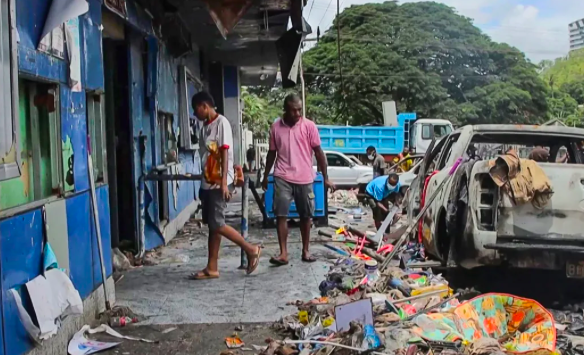Bishops are worried by looting in Port Moresby and its consequences
The death toll from the 10 January unrest has risen to 22 people. The country faces socio-economic collapse. For Fr Giorgio Licini, Secretary General of the Bishops' Conference of Papua New Guinea, “The common citizens, the Churches, the State, and the government are equally responsible.”
Port Moresby (AsiaNews) – Events on 10 January in Port Moresby will be remembered as “Black Wednesday”. On that day, protests turned violent in the capital of Papua New Guinea after sharp cuts to civil servants’ salaries.
Prime Minister James Marape blamed the problem on “a computer glitch"; however, as a result, hundreds of shops were attacked, prompting the government to declare a state of emergency, followed by clashes that left at least 22 people dead.
As the seriousness of the country’s social crisis became clear that day, the Catholic Bishops' Conference issued a statement. “Tragically there was loss of human lives,” reads the press release signed by the Archbishop of Port Moresby, Card John Ribat.
“Many of our citizens and small business farmers that rely on these stores for the sale of their local produces” have suffered. This can but add to “the growing unemployment”.
The destruction on 10 January was caused “by a lawless mob taking full advantage of the police inability to do their work,” the statement goes on to say.
“We are getting reports that even Catholics and Christians who go to church and some who are involved in pastoral ministries, prayer groups, youth ministries joined in the mayhem on the day.” Hence, “We feel sad and ashamed that they did not show courage and resilience of their faith and allowed themselves to go with the flow of the mob.”
Events on 10 January are a wake-up call for the government, but also for the local Catholic Church, which expects to welcome Pope Francis in a visit this summer.
Ultimately, “There should be realistic, deliverable and achievable policies on labour, employment, youth, social security, national security, unaddressed issues,” the statement says.
Also writing in the wake of Black Wednesday, Fr Giorgio Licini, PIME missionary and secretary general of the Catholic Bishops' Conference of Papua New Guinea and Solomon Islands, notes that “the blame game started as if there was somebody more responsible than others. But we need to take collective responsibility. The common citizens, the Churches, the State, and the government are equally responsible.”
More specifically, he writes that “The Churches are too fragmented now. The mainline traditional Churches have lost a lot of their moral ascendence on the communities.”
“The new Evangelical and Pentecostal communities largely confuse faith, politics and money pursuing the Prosperity Gospel rather than the conversion of hearts and righteousness of life. The drop in general education and critical thinking is driving the country into the abyss of religious fundamentalism,” he adds.
Following the events of that day, the prime minister reshuffled his cabinet, "but those who failed to control and discipline the police,” Fr Licini notes, “are still in charge of the police.”
Indeed, “Those who just a few months ago astonishingly told the Parliament that there is no employment emergency in the country are still sitting somewhere in Waigani making or helping make decisions.” Waigani is a suburb of Port Moresby where parliament is located.
“Some are looting the city,” that is “perhaps because others are looting the country. Morally and politically, if not financially.”
Photo: Still from local broadcaster AFPTV on 11 January 2024 in Port Moresby.







.png)










